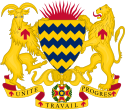 |
|---|
A constitutional referendum was held in Chad on 6 June 2005. The amendments to the constitution were approved by 66% of voters.
 |
|---|
A constitutional referendum was held in Chad on 6 June 2005. The amendments to the constitution were approved by 66% of voters.
The proposed amendments to the constitution included the removal of two-term limit on the President, the replacement of the Senate with a Cultural, Economic and Social Council, and giving the President powers to amend the constitution. [1] [2]
The amendments were proposed by incumbent President Idriss Déby, who was due to complete his second term in 2006. In June 2001 Déby had promised to step down after his second term, stating: I make a public commitment: I will not be candidate at the 2006 presidential election. I will not change the Constitution [...] What remains to do for me in my last mandate, is to prepare Chad for alternation in government.
While Dèby's Patriotic Salvation Movement (MPS) campaigned for "yes", the opposition was divided among those who called for a boycott of the vote and those who called for a "no" vote. The abstentionists allied themselves in the Coordination des Partis politiques pour la Défense de la Constitution (CPDC), an alliance of 24 parties including the Rally for Democracy and Progress and the Union for Renewal and Democracy. The parties that campaigned for a "no" vote included the Front of Action Forces for the Republic and the Rally for the Republic – Lingui.
Do you support the constitutional law proposal of revision of the Constitution of 31 March 1996 approved by the National Assembly on 23 May 2004?
| Choice | Votes | % | |
|---|---|---|---|
| For | 1,835,392 | 65.75 | |
| Against | 956,180 | 34.25 | |
| Total | 2,791,572 | 100.00 | |
| Valid votes | 2,791,572 | 97.39 | |
| Invalid/blank votes | 74,810 | 2.61 | |
| Total votes | 2,866,382 | 100.00 | |
| Registered voters/turnout | 4,958,156 | 57.81 | |
| Source: African Elections Database | |||
| Regions | Registered Voters | Voters | Invalid Votes | Valid Votes | For | % | Against | % | Turnout |
|---|---|---|---|---|---|---|---|---|---|
| Batha | 313,441 | 203,955 | 1,943 | 202,012 | 137,224 | 67.93 | 64,788 | 32.07 | 65.1 |
| Borkou-Ennedi-Tibesti | 96,945 | 69,718 | 756 | 68,962 | 52,487 | 76. 11 | 16,475 | 23.89 | 71.9 |
| Chari-Baguirmi | 260,297 | 150,371 | 3,478 | 146,893 | 92,548 | 63.00 | 54,345 | 37.00 | 57.8 |
| Guéra | 248,861 | 151,516 | 1,884 | 149,632 | 102,046 | 68.20 | 47,586 | 31.80 | 60.9 |
| Hadjer-Lamis | 328,955 | 217,327 | 2,740 | 214,587 | 144,936 | 67.54 | 69,651 | 32.46 | 66.1 |
| Kanem | 300,089 | 159,220 | 901 | 158,319 | 110,726 | 69.94 | 47,593 | 30.06 | 53.1 |
| Lac | 202,651 | 124,161 | 1,219 | 122,942 | 87,981 | 71.56 | 34,961 | 28.44 | 61.3 |
| Logone Occidental | 268,521 | 121,017 | 5,971 | 115,046 | 58,292 | 50.67 | 56,754 | 49.33 | 45.1 |
| Logone Oriental | 258,420 | 138,786 | 4,530 | 134,256 | 76,927 | 57.30 | 57,329 | 42.70 | 53.7 |
| Mandoul | 242,256 | 171,000 | 7,523 | 163,477 | 102,812 | 62.89 | 60,665 | 37.11 | 70.6 |
| Mayo-Kebbi Est | 323,160 | 178,833 | 4,012 | 174,821 | 104,279 | 59.65 | 70,542 | 40.35 | 55.3 |
| Mayo-Kebbi Ouest | 195,714 | 137,366 | 6,143 | 131,223 | 81,593 | 62.18 | 49,630 | 37.82 | 70.2 |
| Moyen-Chari | 243,182 | 117,095 | 5,860 | 111,235 | 61,923 | 55.67 | 49,312 | 44.33 | 48.2 |
| Ouaddaï | 507,112 | 384,585 | 9,038 | 375,547 | 274,982 | 73.22 | 100,565 | 13.04 | 83.7 |
| Salamat | 161,162 | 101,339 | 849 | 100,490 | 68,647 | 68.31 | 31,843 | 31.69 | 62.9 |
| Tandjilé | 253,795 | 129,590 | 4,980 | 124,610 | 74,045 | 59.42 | 50,565 | 40.58 | 51.1 |
| Wadi Fira | 190,234 | 137,482 | 1,026 | 136,456 | 95,678 | 70.12 | 40,778 | 29.88 | 72.3 |
| N'Djamena | 563,361 | 173,021 | 11,957 | 161,064 | 108,266 | 67.22 | 52,798 | 32.78 | 30.7 |
| Total | 4,958,156 | 2,866,382 | 74,810 | 2,791,572 | 1,835,392 | 65.75 | 956,180 | 34.25 | 57.8 |
| Source: African Elections Database | |||||||||
The constitutional amendment allowed Déby to contest the 2006 presidential elections, in which he won a third term.

The politics of Chad take place in a framework of a presidential republic, whereby the President of Chad is both head of state and head of government. Executive power is exercised by the government. Legislative power is vested in both the government and parliament. Chad is one of the most corrupt countries in the world.
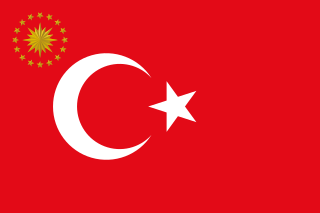
The president of Turkey, officially the president of the Republic of Türkiye, is the head of state and head of government of Turkey. The president directs the executive branch of the national government and is the commander-in-chief of the Turkish military. The president also heads the National Security Council.

The National Assembly was the authoritative legislative body of the Republic of China, from 1947 to 2005. Along with the Control Yuan and the Legislative Yuan, the National Assembly formed the tricameral parliament of the Republic of China.
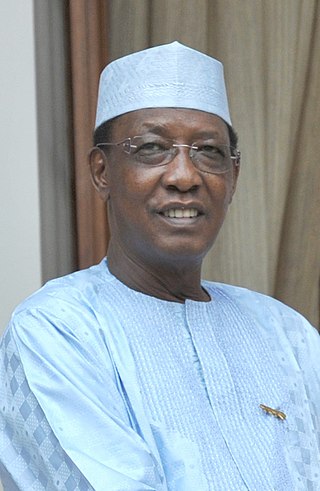
Idriss Déby Itno was a Chadian politician and military officer who was the president of Chad from 1990 until his death in 2021 during the Northern Chad offensive. His term of office of more than 30 years makes him Chad's longest-serving president.

The current Constitution of France was adopted on 4 October 1958. It is typically called the Constitution of the Fifth Republic(French: LA CONSTITUTION DE LA CINQUIÈME RÉPUBLIQUE), and it replaced the Constitution of the Fourth Republic of 1946 with the exception of the preamble per a 1971 decision of the Constitutional Council. The current Constitution regards the separation of church and state, democracy, social welfare, and indivisibility as core principles of the French state.
Jean Alingué Bawoyeu, known in French as the vieux sage, which translates as "wise elder", is a Chadian politician who was Prime Minister of Chad from 1991 to 1992. During the 1970s, he served successively as Ambassador to the United States and France. Later, he was President of the National Assembly in 1990. He served in the government as Minister of Justice from 2008 to 2010 and as Minister of Posts and New Information Technologies from 2010 to 2013.
Lol Mahamat Choua was a Chadian politician who served as his country's head of state for four months in 1979. He was the President of the Rally for Democracy and Progress (RDP) political party.

Presidential elections were held in Chad on 3 May 2006. A referendum in 2005 had led to changes to the constitution that made it possible for President Idriss Déby to run for a third term; having come to power in December 1990, he had previously won elections in 1996 and 2001. Despite a serious rebellion based in the east of the country, the elections were held on schedule; Déby was re-elected with about 65% of the vote, according to official results. The main opposition parties boycotted the election.
Constitutional reform in the Philippines, also known as charter change, refers to the political and legal processes needed to amend the current 1987 Constitution of the Philippines. Under the common interpretation of the Constitution, amendments can be proposed by one of three methods: a People's Initiative, a Constituent Assembly or a Constitutional Convention.
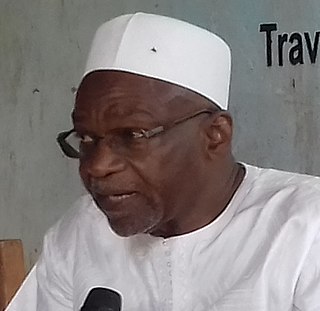
Parliamentary elections were held in Chad on Sunday, 13 February 2011, the first since 2002. The elections were originally scheduled for 28 November 2010, but were postponed following a meeting in September between the ruling party and opposition leaders. According to the National Independent Electoral Commission (CENI), this was due to timing constraints caused by complications encountered during electoral preparations.

The Constitution of the Republic of Chad is the supreme law of Chad. Chad's seventh constitution, it was adopted in 1996, six years after President Idriss Déby rose to power following a successful rebellion against President Hissène Habré, this formal document establishes the framework of the Chadian state and government and enumerates the rights and freedoms of its citizens. In its current form, the contents of the Constitution include a preamble, 16 parts and 225 articles.

A constitutional referendum was held in Chad on 31 March 1996 to approve or reject the new constitutional draft meant to definitively replace the Transitional Charter established by the Sovereign National Conference in 1993. It was approved by 63.5% of voters with a 61% turnout.
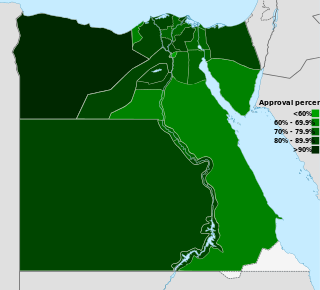
A constitutional referendum was held in Egypt on 19 March 2011, following the 2011 Egyptian revolution. More than 14 million (77%) were in favour, while around 4 million (23%) opposed the changes; 41% of 45 million eligible voters turned out to vote.

General elections were held in Burkina Faso on 29 November 2015. The elections were the first national elections in the country since the 2014 Burkinabé uprising and the departure of President Blaise Compaoré, who had ruled Burkina Faso for 27 years. The party of former President Compaoré, the Congress for Democracy and Progress, was banned from presenting a presidential candidate in the presidential elections but was still able to participate in the parliamentary election.

A constitutional referendum was held in the Republic of the Congo on 25 October 2015 regarding a proposal to change the constitution, primarily to modify the rules regarding presidential terms.

The president of France is elected every five years.

A constitutional referendum was held in Egypt between 20 and 22 April 2019, The main proposed amendments were re-establishing the presidential term to six years, from four previously, and removing the limit of two terms on the president, thereby allowing President Abdel Fattah el-Sisi to potentially remain in power until 2030. The changes were approved by 88.83% of voters who voted, with a 44% turnout.

Presidential elections are scheduled to be held in Chad on 6 May 2024, with a second round, if necessary, to be held on 22 June 2024. The elections will follow a constitutional referendum held on 17 December 2023, following the death of President Idriss Déby in 2021. Incumbent transitional president Mahamat Déby, the son of the previous president Idriss Déby, is running for a full term as the candidate of the Patriotic Salvation Movement, potentially leading to an extension of 33 years of rule by the Déby family.

A constitutional referendum in Chad was held on 17 December 2023 on a new constitution formulated following the death of President Idriss Déby in 2021. The draft had been approved by the National Transitional Council on 27 June 2023. Provisional results were announced on 24 December 2023, and they were validated by the Supreme Court of Chad on 28 December 2023.